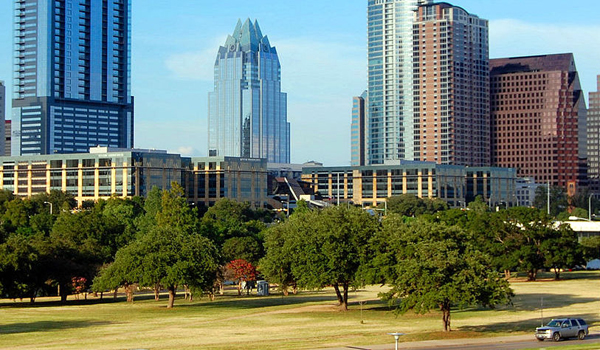- La Feria Community Holds Succesful Business Mixer Event
- Little Nashville to Take Place in Downtown Mercedes
- Lions Basketball Captures District Gold
- La Feria ISD Students Compete in Regional Chess Tournament
- Lions End First Half of 32-4A on a High Note
- La Feria ISD Held Another Successful Parent Conference
- Strong Appearance for Lions at Hidalgo Power Meet
- LFECHS Students Get to Meet Local Actress
- Students Participate in Marine Biology Camp
- Two LFECHS Students Qualify for All-State Band
Texas Groups Fight State Plan to “Cut” Local Tree Regulations
- Updated: August 4, 2017

A stand of live oak trees in Butler Park frames the downtown Austin skyline. Conservationists say urban forests are critical to air and water quality in Texas cities. Photo: Wikimedia Commons
by Mark Richardson
AUSTIN, Texas – Conservation groups, cities and business interests are fighting bills in the Texas Legislature that would strip municipalities of the ability to regulate the removal of old-growth trees.
Dozens of people have testified before state House and Senate committees, with most speakers opposed to making the state the only entity that can regulate urban forests.
Mary Dennis, president of the Texas Municipal League, representing more than 1,100 member cities, told lawmakers her group believes local policy decisions should not be made by state officials.
“The decision here on whether to have local tree-protection rules should be made at the local level by the citizens in each community,” she said, “and not by an over-reaching, centralized government here in Austin.”
The bills were put on the legislative agenda by Gov. Greg Abbott, who’s angry because Austin officials refused to let him remove a tree at his personal residence. Conservative groups and developers are pushing to limit local tree-preservation ordinances, claiming they violate landowners’ rights under the Texas Constitution.
But conservation groups have said the problem isn’t that simple. Thais Perkins, executive director of TreeFolks, a nonprofit group dedicated to preserving and growing trees, told lawmakers that each tree plays a part in the larger ecosystem.
“I encourage you to look at forests not just as individual trees, but as part of a larger organ, because that’s how a forest in an urban setting functions,” she said. “You can only remove so many cells from a liver before it does not continue to work. And a forest is like that.”
Perkins said a healthy forest in an urban area often can postpone the need to build additional water-treatment or power plants.
“It is the intact, whole forest that does things like slow storm water, filter it, clean it, allow us to achieve ozone attainment, purify the air, provide habitat,” she said. “Those things are not individual tree functions, they are whole-forest functions.”
Despite the opposition, both committees voted preliminary approval of the bills. The full House and Senate should take up the issue before the current 30-day special session ends in mid-August.
The bills’ text is online at capitol.state.tx.us.


